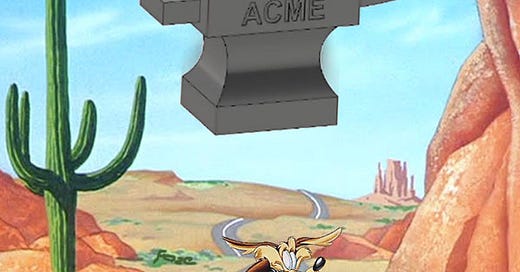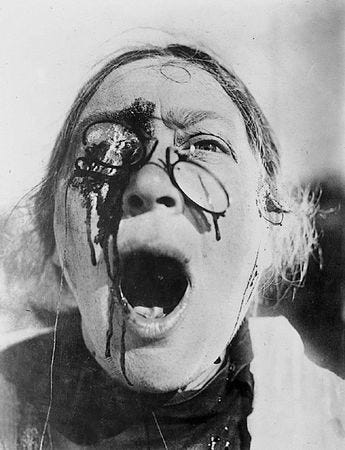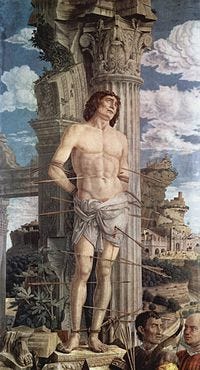You never see the catastrophe coming. You walk into work you love. At 10:00 AM, they call you in and tell you you no longer have this job. You’ve been having trouble speaking to your spouse, who doesn’t listen with the same patience as before. Maybe get away for a weekend? You discover that they have been chronically unfaithful, and they want out.
You have a persistent cough. Allergies? No, it’s throat cancer. You will be sick for the next four years and counting. Life is a series of anvils that fall from the sky on Wile E Coyote.
I got up from bed to pee around 1:00 AM last Tuesday, May 14th. As I stepped across the threshold of the bathroom door, without any warning, two of the arteries serving my tongue hemorrhaged. The tumour had eroded them. I felt no pain, but I recall a sensation that was something like a fragile sheet of paper tearing.
Instantly, my mouth filled with blood. I should have experienced fear, but I was overwhelmed by surprise. The arterial bleeding could have killed me. I could have aspirated blood into my lungs—that is, drowned in my own blood—or I could have bled out.
I vomited the blood into the sink. Instantly, blood refilled my mouth. I cycled through this several times.
I must have been thrashing because my wife—a physician, thank God—found me. She got me sitting up in bed and called the paramedics.
Faint with blood loss, I do not remember much of what happened next. My wife says the paramedics gave me a drug that stopped the bleeding. The ambulance took me to the emergency department of a local hospital.
ED doctors and nurses cared for me for several hours. I recall doctors walking me through questions about what procedures I would accept to keep me alive in extremis (that is, an advance directive). Do this when you are healthy and not dizzy from blood loss.
The ED transferred me to the ICU. I needed to be in the ICU because of the severity of the risk of renewed bleeding. I have visited ICUs as a statistical consultant. It is another thing to spend nights there as a patient. Most of the patients were silent, unmoving, and comatose. Their bodies were like cars with wheels off, up on concrete blocks.
However, next to me, separated by a curtain, was a gentleman with renal disease and kidney stones. He must have been in excruciating pain. He was also partially demented.He woke up delirious and screaming every 30 minutes or so.
Late Tuesday afternoon, the interventional radiology team embolized the broken arteries. They snaked a catheter up from my groin to the base of my tongue. When the radiologist explained this to me, I thought she was joking—it sounded impossible—but it’s not impossible. The radiologists use real-time imaging to steer their tiny, flexible pipe to its target. Then they sealed the holes in my arteries by pumping in something like superglue.
That fixed the hemorrhage. I stayed in the hospital for a while longer because my oxygen saturation was low and to ensure there were no clots that could cause a stroke. The doctors discharged me home on Thursday evening.
I am exhausted, shaken up, and experiencing severe pain in my mouth. I cannot speak well or chew solid food. Putting even soft food on my tongue is like dipping it in acid. My tongue’s on fire. During the embolization, they inserted a breathing tube, traumatizing the soft tissue of my tongue and mouth. This inflammation will relent in a few weeks, and I should return to my pre-hemorrhage pain baseline.
Until then, I mainly communicated by text on my phone, including texting people in the same room. Hilariously, they often started texting me back, forgetting that they could just talk.
And this created an opportunity. If I can’t speak, why not be silent? If I am exhausted, why not be still? I’ve benefited greatly from being silent during long religious retreats. One of the points of such retreats is to cultivate interior strength and focus. Thomas Merton wrote that we need solitude because,
To be a person implies responsibility and freedom, and both these imply a certain interior solitude, a sense of personal integrity, a sense of one’s own reality and of one’s ability to give himself to society.
Romano Guardini wrote that some things that can be seen only in silence.
The inmost spirit lives by truth, by its recognition of what is and what has value. Man expresses this truth in words. The more fully he recognizes it,… the richer his words. But truth can be recognized only from silence.
Quiet and purpose fill me. I sojourn on.









Bill I’m sorry to hear about this. I’m glad you’re recovering and I hope the pain subsides quickly.
I'm sorry your going thru this. My mom had cancer I felt bad I lived out of state and was not able to care for her. I enjoy your writings. Take care🌺🌹❤️